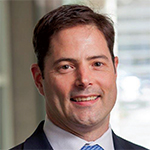Any hospitalist working for the largest HM group (HMG) in the country has one heck of a top-down perspective. And if you’re Robert Zipper, MD, MMM, SFHM, a regional chief medical officer (CMO) overseeing 25 hospitalist programs in the Pacific Northwest and Northern California for Sound Physicians, you love it.
“In my role, I really like working with younger leaders and those that are the future of the specialty,” he says, “but mostly I like knowing that I am supporting people that are doing incredible work, day in and day out.
“And I am never, ever bored.”
And, while never unengaged in his day-to-day job, Dr. Zipper has also been an active member of SHM. A former member of the Hospital Quality and Patient Safety (HQPS) Committee, Dr. Zipper currently chairs the Leadership Committee. The latest line on his resume is his role as one of seven new members of Team Hospitalist, the volunteer editorial advisory board of SHM’s official newsmagazine.

Many physicians at that time were jaded, feeling that the golden era of being a doctor had come and gone. The best advice I ever received was to ignore their negativity and to make my own future.
–Dr. Zipper
Question: Why did you choose a career in medicine?
Answer: Both of my parents were psychotherapists, and I knew that I wanted to do something in healthcare…but not that!
Q: How/when did you decide to become a hospitalist?
A: I always liked inpatient medicine. I did 50/50 inpatient and outpatient for my first three years out of training, and the hospitalist part of that crumbled. That led to the opportunity to do pure hospital medicine in the same community in 2002, and I took it!
Q: Tell me a little more about medical school, residency, etc. Was there a single moment you knew “I can do this?”
A: I chose a single large institution because I wanted to know the people I worked with, as healthcare is all about relationships. In medical school, I didn’t spend more than two months at any given hospital doing rotations, and that didn’t seem like the best way to learn. It wasn’t like the real world. I never had self doubt that I would finish what I had started, partly because I had to work so hard to get into medical school in the first place.
Q: What do you like most about working as a hospitalist?
A: I enjoy the high acuity, but miss the longer-term relationships of outpatient care.
Q: What do you dislike most?
A: My role as regional CMO for a large management company never ends. I’m never “done with my shift,” so to speak. I love my job but would love more family time, too.
Q: What’s the best advice you ever received?
A: I was applying for medical school in the late 1990s, and I worked as a tech in an emergency department in Michigan. Many physicians at that time were jaded, feeling that the golden era of being a doctor had come and gone. The best advice I ever received was to ignore their negativity and to make my own future. This came from an emergency medicine resident named Paul Blackburn, who later went on to be the ED residency director at University of Arizona.
Q: Did you have a mentor during training or early career?
A: Not really, though I thought about oncology, and one of my oncology attendings played a special role for me. I ultimately chose not to do that specialty because I couldn’t deal with the high mortality—I took the grim reality that so many patients face home with me.